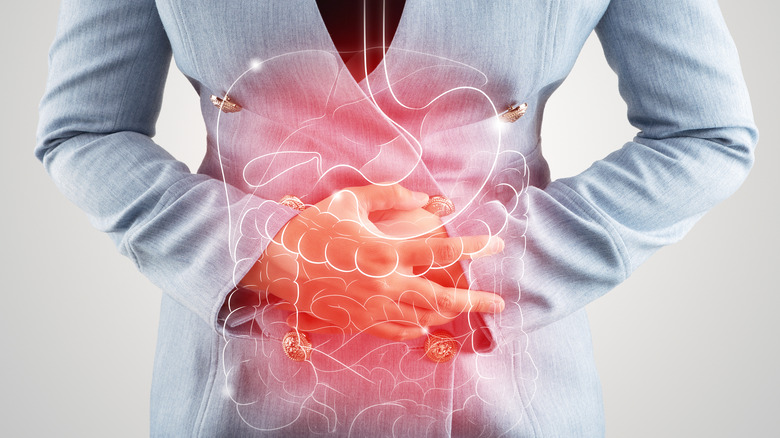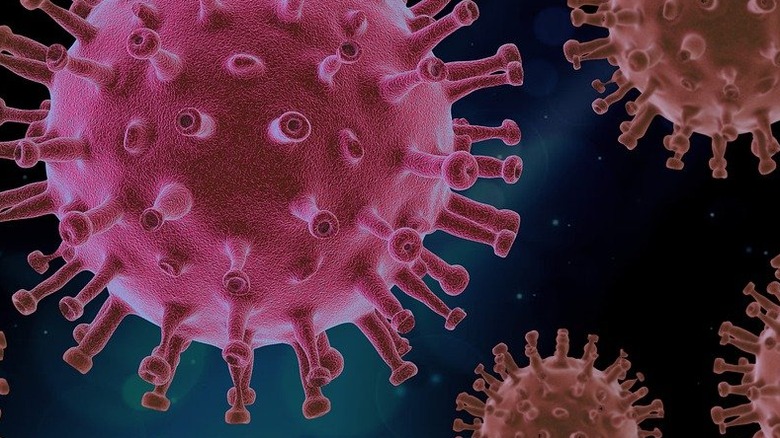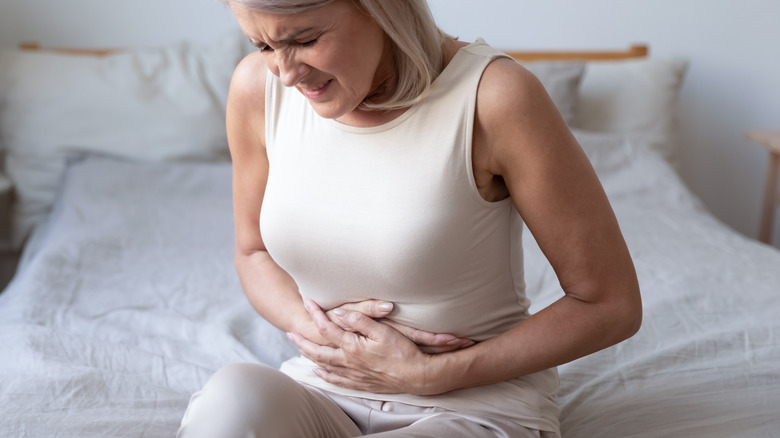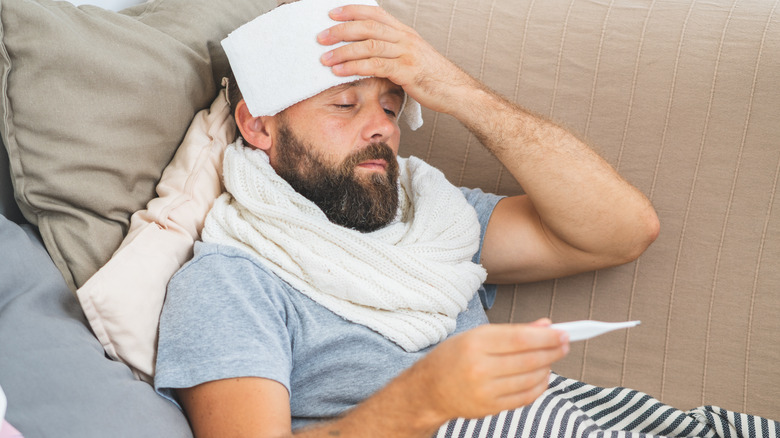Norovirus Explained: Causes, Symptoms, And Treatments
What is the norovirus? You've most likely had it before, even if you weren't familiar with its technical name. It's sometimes called the stomach bug or stomach flu, but the latter is a bit of a misnomer. The flu is caused by the influenza virus and targets the respiratory system, and it's not related to the norovirus. The norovirus, as you may have guessed from its nicknames, targets the stomach and intestines. It is also sometimes called the Norwalk virus, based on the location of the first outbreak in Norwalk, Ohio in 1968 (via Food Safety Experts).
According to the CDC, the norovirus is the "leading cause of vomiting and diarrhea from acute gastroenteritis (inflammation of the stomach and intestines) among people of all ages in the United States." The virus can be contracted any time, but it is most prevalent between the months of November and April, and even more so in years when a new strain is identified. Read on to learn more about the virus, so you'll know what to do the next time you encounter it.
Primary cause: a group of viruses
The primary cause of any norovirus infection is the virus itself. As with the common cold, the norovirus is actually not a single virus, but a group of viruses in the Caliciviridae family, also known as caliciviruses (per the Pennsylvania Department of Health). The CDC describes noroviruses as very contagious and notes that outbreaks are common.
That said, as with any viral infection, there are always secondary causes to consider, i.e. how exactly you contract the virus and why it turns into a full-blown infection. In reality, we all regularly come into contact with countless viruses. In an interview with ABC News, New York University director of clinical microbiology and immunology Philip Tierno mentioned that people encounter roughly 60,000 germs every day. This includes viruses, though they don't all cause us to get sick. (Otherwise, we'd all be sick all the time.)
For instance, regularly washing your hands will get rid of most, if not all, of those germs. Handwashing can help prevent diarrhea and other infections, according to the CDC. This is especially important in the case of the norovirus, which is found in the feces of infected people and can be spread when an infected person doesn't wash after using the bathroom.
Apart from handwashing (or lack thereof), it's important to consider other secondary causes and potential avenues of infection.
Secondary cause: closed and crowded environment
Because noroviruses are so contagious, large crowds give them the opportunity to spread. The Mayo Clinic identifies closed and crowded environments to be the most frequent site of norovirus infections. These include nursing homes, schools, hospitals, cruise ships, child care centers, overcrowded apartments and houses, and other places where large numbers of people meet in close quarters.
Overcrowded housing and buildings can elevate your risk of contracting an infectious disease, according to the WHO Housing and Health Guidelines (which rates the strength of the evidence of a higher risk for infectious gastroenteritis diseases in such housing to be "moderate to high"). Overcrowding can even contribute to the evolution of new diseases. The Encyclopedia Britannica notes that overcrowded or densely populated areas can serve as "breeding grounds" for new strains of viruses and bacteria.
Overcrowding can be hard to define and measure. Persons per room, persons per bedroom, persons per unit, homes vs. offices (or schools), and individual buildings vs. entire cities are just some of the factors that need to be considered, but not all. For instance, none of those factors take into account one-off events, e.g. large crowds that temporarily gather in one place for things like concerts or demonstrations. That said, use your best judgment. If you feel a place is overcrowded, take precautions, or avoid it altogether if you can.
Secondary cause: contaminated food
You'll sometimes hear the norovirus referred to as food poisoning. This is because it can be spread through contaminated food. While other viruses and bacteria can also cause food poisoning, the CDC lists the norovirus as the number one germ-causing foodborne illness. The Minnesota Department of Health also identifies the norovirus to be "by far" the leading cause of food poisoning outbreaks in the U.S.
Cooking food at high heat can deactivate the virus, and most outbreaks related to food can be traced to raw, unprocessed foods like uncooked oysters (via Food Safety Experts). However, cooking food may not be enough if it is handled by an infected person after cooking. To minimize the risk of food poisoning, it is essential that restaurant staff and those who work in the processed food industry stay home when they are sick, even up to 48 hours after they feel better.
That said, calling the norovirus "food poisoning" can be misleading, because the virus can be spread by other means. The Mayo Clinic notes that you can also contract the virus by touching contaminated surfaces or having direct contact with someone who is infected. In another article, the medical center points out that the virus can survive on surfaces that have not been adequately disinfected for months at a time. With this in mind, it's always a good idea to regularly clean the surfaces in your home, especially if you or anyone in your house has recently been sick.
Secondary cause: sleep deprivation
Yes, sleep deprivation can contribute to viral infection. A study from the Journal of Immunological Research calls sleep an "important modulator of the immune response," suggesting sleep deprivation can weaken your immune system and make you more susceptible to infectious disease. This is supported with evidence that lack of sleep is associated with higher rates of viral infection.
A Mayo Clinic Q&A also asserts that lack of quality sleep affects your immune system. This is because your immune system produces important cells and antibodies that fight infection during sleep. Without sufficient sleep, you may not have a sufficient response from your immune system when exposed to viruses or bacteria, potentially causing you to get sick.
With this in mind, making sure to get enough sleep every night (and getting extra sleep to catch up when you're sleep deprived) will help to protect you not just from norovirus infection, but from all types of infection. Just in case you needed more convincing, a meta-analysis from the journal Sleep found sleep deprivation to be associated with negative mood, negative emotions, and poor emotional regulation. The negative consequences of losing sleep are well-known and go far beyond an increased risk of contracting the norovirus (or any virus).
Secondary cause: chronic stress
Stress is an often overlooked factor in the development of infectious diseases. Per Healthline, studies have shown higher stress levels to be associated with higher susceptibility to infection from viruses and other pathogens. According to these studies, chronic stress appears to weaken the immune system.
That said, stress is complicated. It's important to distinguish chronic stress from acute stress, because the two can have very different effects. An article from the Malaysian Journal of Medical Sciences explains that short-term stress can boost the immune system, but chronic stress can weaken it. This is in part because the stress hormone cortisol is a powerful anti-inflammatory agent, so small doses can be beneficial. However, chronically high cortisol can make your immune system become resistant and exacerbate inflammation (according to a study in Current Opinion in Psychology).
Thankfully, stress reduction can help. A meta-analytic review from the journal Psychotherapy and Psychosomatics found substantial evidence that psychological stress reduction could improve immunity. To reduce your risk of contracting a norovirus infection (or any other type of infection), do what you can to combat any chronic stress in your life. Meditation and mindfulness practices, yoga, light exercise, journaling, screaming into a pillow — do whatever works for you.
Symptom: nausea
Perhaps the most common symptom of norovirus infection is nausea. The Minnesota Department of Health lists nausea as the number one symptom, and they include abdominal cramps as well. As the virus targets your stomach and intestines, it makes sense that it would cause stomach pain and nausea.
Additionally, nausea is often accompanied by a loss of appetite. The National Health Service of the UK identifies loss of appetite as one of the symptoms of the norovirus. It can be hard to have an appetite when you feel nauseated, but it's still a good idea to eat and drink small amounts so your body has some energy to fight the infection. Water, herbal tea, apple juice, applesauce, bananas, toast or crackers, and rice are all good options for when you feel nauseated.
That said, don't force yourself to eat if you really can't stomach anything. It may take several days for the nausea to pass.
Symptom: vomiting or diarrhea
The main symptoms people associate with the norovirus are vomiting and diarrhea. In fact, WebMD points out that some people refer to it as the "winter vomiting bug." Thankfully, these symptoms don't typically last longer than a couple of days. The duration of the infection tends to be relatively short-lived: The first symptoms can show up within a day or two of being exposed, and they don't tend to last longer than 3 days.
That said, you may continue to shed the virus and be contagious for up to 8 weeks. You will become progressively less contagious over time, but it's still a good idea to be cautious after recovering from a norovirus infection. The experts at Food Safety Experts claim you are actually most contagious during the first 48 hours after your symptoms subside.
When dealing with vomiting and diarrhea, make sure you are replacing lost fluids with water and electrolytes. There are many varieties of electrolyte tablets and powders that can easily be added to water for a quick electrolyte boost, and it's a good idea to keep some on hand for situations like this. It is also absolutely essential to wash your hands and thoroughly clean any vomit that didn't make it into the toilet, since the virus will be present in your vomit and feces.
Symptom: fever
Another symptom of norovirus infection is fever. The CDC identifies fever as one of the less common symptoms of the virus, and a fact sheet from the Minnesota Department of Health specifically mentions low-grade fever as a less common symptom. A low-grade fever is generally defined as a body temperature between 99.6 and 100.3 degrees Fahrenheit (via Cedars Sinai).
If your body temperature is above 99.6 degrees Fahrenheit, this could be an early sign of norovirus infection (or another viral or bacterial infection). When dealing with a fever, be sure to drink plenty of clear fluids and get lots of rest. Depending on how high your temperature is, you may want to take a fever reducer like acetaminophen, which has the added benefit of relieving muscle pain and potentially helping you rest. Also, do what you can to stay cool — cold compresses and tepid baths can help with this.
Symptom: body aches
Body aches and headaches are also considered symptoms of norovirus infection. The CDC identifies these as less common symptoms. Note, however, that less common doesn't necessarily mean uncommon. Body aches often accompany a fever, which is another less common symptom of the virus, but they may also be present on their own without a fever. Body aches and headaches can make it very difficult for you to do anything, even rest.
For severe headaches and body aches, consider taking an over-the-counter pain medication, especially if the pain is keeping you from sleeping. Some light stretching can also help, as can hypnosis. An article from the American Psychological Association found hypnosis to be a promising treatment for pain, and many free hypnosis recordings are available online. Rest is crucial for recovery from infection, so do what you can to treat any pain that's preventing you from getting the healing rest you need. Sleep is necessary both for healing from current infections and preventing future ones.
Treatment: drink plenty of fluids
Conventional wisdom is right: Drink plenty of fluids. The CDC lists this as the first recommended treatment for norovirus infection. This is largely because vomiting and diarrhea are the main symptoms of the norovirus, and it's crucial to replace the fluids and electrolytes you lose when you experience vomiting and/or diarrhea so you don't become dehydrated.
If you're not replacing fluids lost to vomiting and diarrhea, you run the risk of becoming severely dehydrated. The CDC goes on to warn that severe dehydration may require hospitalization and IV fluids. You definitely want to avoid getting to this point if you can, and you can prevent this by continuing to drink water and other fluids.
That said, make sure to add electrolyte tablets or powders (or failing that, a pinch of salt) to at least some of the water you're drinking. If you're just replacing the fluids you're losing with pure water, you risk electrolyte imbalance (via Healthline), which can be just as serious as dehydration and cause even more nausea. Note that most electrolyte tablets or powders have added sugar, but this isn't necessarily a bad thing when you're recovering from a norovirus infection, especially if you haven't been able to eat anything.
Treatment: eat easy-to-digest foods
If and when you're able to keep food down, it's a good idea to eat foods that are easy to digest. The Cleveland Clinic recommends "bland" foods to help you recover. The National Library of Medicine goes into some detail about what the bland diet entails: Cooked vegetables, bananas, applesauce, melons, fruit juices, white breads and crackers, soup, broth, and weak tea are some examples of bland foods that can soothe an upset stomach.
Refined grains are specifically mentioned, which may seem counterintuitive. We've all heard that whole grains are healthier, and in the vast majority of cases, they are. The USDA MyPlate website emphasizes that whole grains are healthier than refined grains and can help lower your risk of a variety of chronic diseases. However, whole grains are also harder to digest. This is part of what makes them healthy, since they have more fiber and other nutrients that require more work for your body to break down than refined grains. That said, you don't want to eat anything hard to digest when recovering from a norovirus infection. Refined grains are fine to eat when you're sick, and they may even help you recover.
Treatment: ginger
Ginger is a powerful anti-inflammatory and anti-nausea food. A study from Integrative Medicine Insights found ginger to be an effective and inexpensive treatment for nausea and vomiting during pregnancy and chemotherapy. Additionally, a systematic review from Food Science & Nutrition claims ginger can be very effective for nausea relief, as well as anti-inflammatory, antioxidant, antitumor, and antiulcer purposes. Unsurprisingly, the root vegetable has been used as medicine for many centuries.
Common ways to consume ginger include as an herbal tea and in powdered form. Ginger ale is also very popular for upset stomachs. Note, however, that many brands of ginger ale don't contain any actual ginger, so make sure to check the label. If you enjoy the taste of ginger, consider buying the actual root vegetable and adding it to your smoothies, soups, or other dishes. Give it a rinse and peel it with the back of a spoon (or keep the peel on). Then, it's ready to be sliced or diced, tossed into a smoothie, or added to whatever you'd like.
That said, ginger has a strong, spicy flavor that not everyone enjoys. Thankfully, you can still get benefits from ginger without adding it to your food or drink. Many supplement companies sell ginger in capsule form, and these can be just as effective for nausea relief as food or drinks with ginger (via Healthy Eating). If you'd like to experience the benefits of ginger without having to taste it, ginger capsules are an option.
Treatment: stay home and rest
As WebMD reminds us, you'll need to rest for at least a few days if you have a norovirus infection. Because sleep is so important for the immune system (via a study from the Journal of Immunological Research), resting to recover from an infection is absolutely essential to give your immune system a chance to build its defenses and take on the infection. While there are a variety of ways to treat the symptoms of the infection, there isn't really a specific medication or any other treatment guaranteed to get rid of the infection. At the end of the day, it's really up to your immune system to beat the virus, which means you need to rest so your immune system can do its job.
Additionally, staying home is a good idea both for your own sake as well as others'. Staying home will help you rest and recover, and it will also decrease the likelihood of you spreading the infection to others. The National Health Service of Scotland recommends staying home at least 48 hours after your symptoms have stopped, in part because you will still be contagious during this time (even though you're no longer symptomatic).
Treatment: take an anti-diarrheal if necessary
For the majority of norovirus infections, it's enough to treat the symptoms and wait for the infection to run its course. Occasionally, however, we might need to do a bit more.
An article from Insider says anti-diarrheal medications are usually not needed, but you might want to consider trying them if you've been having diarrhea for over two days. Anti-diarrheal medications can help temporarily relieve diarrhea. That said, it's a good idea to consult your healthcare provider if you've been experiencing norovirus symptoms for more than a couple of days.
Note that there is no actual cure for norovirus infections, but they tend to be very short-lived. Most infections will go away on their own in a matter of days, so it's really a matter of waiting out the infection and allowing yourself to recover. Take good care of yourself to help prevent these infections — and to help you recover when they do occasionally happen.















